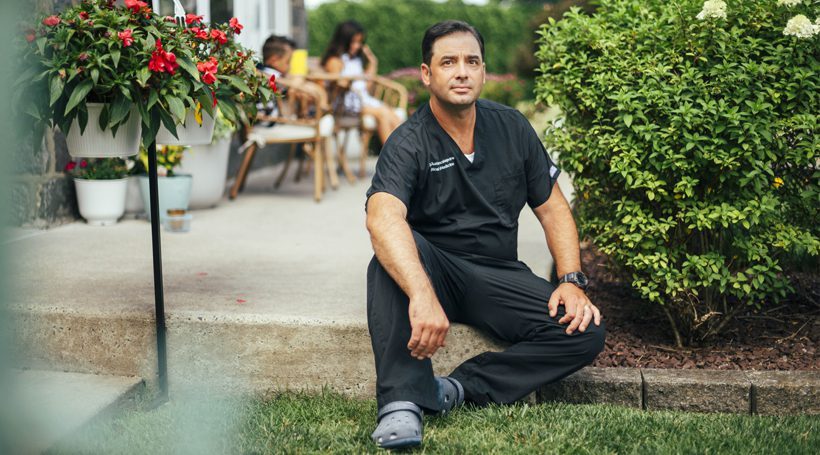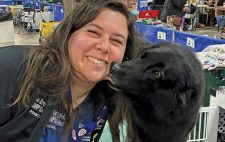Photography by David Michael Howarth
Justin Sciancalepore, DO, was a young doctor fully immersed in his medical fellowship with Jefferson Washington Township Hospital when he very slowly realized something was wrong. Just 35 at the time, Sciancalepore was working in Jefferson’s comprehensive stroke center when he suffered a stroke in 2017. His wife had noticed some unusual signs, but Sciancalepore thought he was fine. It wasn’t until 2 days later, while working in the hospital, that his symptoms worsened. Because of his training, the critical care and pulmonary medicine resident knew what was happening, and it was terrifying.
Even as he survived the stroke, he knew the damage it caused his brain could have ended his career or even result in him not being able to breathe on his own. Sciancalepore spent 10 days as a patient in Jefferson’s ICU before he was transferred to a rehabilitation center. It was a full 6 months before he was able to gain full functioning and return to his residency. The experience, he says, has changed his perspective on just about everything.
Q: Can you tell us about your wife first noticing your symptoms?
Well, I didn’t necessarily ignore the symptoms my wife had seen, but like any other practitioner trained to look for stroke, I tried to objectively assess the patient – which was tough to do since I was the patient. She said she saw a facial droop on the left side. So I looked in the mirror and I didn’t see it. She also said she had heard some slurred words and speech, which I couldn’t pick up. She still called 911, which was the right thing to do. The EMTs walked into my house, and I’m sitting on my couch. They objectively assessed me and said, ‘You know, we don’t see the things that your wife is saying either’ but they did suggest I get it checked out at the hospital. And my downfall was that not only did I not listen to my wife, I did not listen to the emergency medical personnel.
Q: What was the cause of the stroke?
You’re most vulnerable to disease at times of distress. And in my case, it was a perfect storm. It was 3 months into my fellowship. I was on call the entire weekend so I was going on 2 hours of sleep in that 48-hour time period. My wife and I had just bought a house, I had just finished taking my medical boards and we had a 3-month-old baby at home.
I was diagnosed with a blood clot disorder in my central lobe. It’s not inheritable – it’s considered a medically acquired syndrome. It can form clots not only in veins but also arteries, and there is no real explanation why it happens. In a sense, it behaves similar to what we were seeing with Covid when Covid first came out. That’s when people were getting these clots in their brains, hearts and lungs seemingly out of nowhere.
Q: What was it like to go through rehab?
I had a really profound experience when I got to the rehab center. The first thing the therapist asked me was what goals I wanted to accomplish. I thought about it long and hard, and then I explained to the therapist that my son was 3 months old and weighed 15 pounds. I wanted to be able to hold him in my arms and not drop him. They literally handed me a 15-pound dumbbell with a diaper that I had to carry around with me everywhere.
Even though I treated stroke patients regularly, there was so much I didn’t realize about how patients relearn skills, and I had no idea what it was going to take for me to get back to being functional again. I went to rehabilitative driving school, which was fascinating. It’s like the driving lessons you get when you’re 16 or 17, except occupational specialists are timing your reactions. It was nerve-wracking going from being a very functional physician to somebody who needed other people to tell me I could drive a car again.
I also had extensive neuropsychology testing to make sure it was safe for me to go back to work. We had to make sure there was no chance I was going to have any problems from a cognitive perspective. And through the testing I was able to show them that I could do intubations, arterial caths, all the typical procedures I do on the job.
Q: How did having a stroke change your relationship with patients?
I’m a lot more empathetic to what they’re going through, how devastating a stroke can be, how it changes lives in an instant and how compassionate care helps them get better faster.
When I went back to training doctors who were doing neurological exams, I stressed that they shouldn’t shout if the patients don’t respond right away, which is a natural thing to do when someone doesn’t respond. Because the connections have been severed in their brains, it just takes a lot longer to respond. Doctors need to be cognizant that the patient really is trying, and shouting orders won’t get them to do it any faster. It’s better to tell them to try later or that they need to keep working on it.
That level of empathy is something I think gets lost in translation.
Also, I’m convinced the reason I got better as quickly as I did was simply because of the care and love that my wife provided me. Every single day that I was in the hospital, she would come with the kids. It gave me a desire to try harder. If I was told to take 10 steps, it gave me the desire to do 20.
Q: Do you have any advice for stroke patients?
Don’t delay care. Every second that the brain is not getting blood flow, that piece of the brain is dying because it’s starved of oxygen and the nutrients it needs to thrive and flourish. So the more you delay your care, the more likely you are to have a worse outcome.
Q: Are there any long-term effects of your stroke?
I’m on medication to control my blood pressure and blood thinners, and I’ll pretty much be on them for the rest of my life. But I’m ok with that. I’m able to have a life with my kids and to still practice medicine. There are trade offs to everything that happens to you. You just have to learn how to work with them and overcome them. Considering that I’ve never been so close to death in my life before that, and with how bad this stroke could have been, any time I have a stroke patient come to my ICU now or somebody with significant debilitation after a cardiac arrest, I’m back to realizing how lucky I am.














